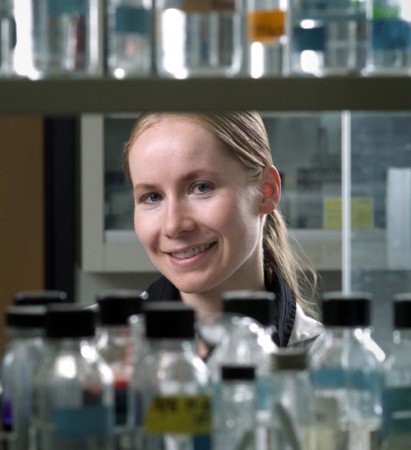 The Ebola epidemic in West Africa in 2014-2015 was the largest in history to be caused by the virus. More than 28,000 cases were reported in 10 countries, and more than 11,000 people died.
The Ebola epidemic in West Africa in 2014-2015 was the largest in history to be caused by the virus. More than 28,000 cases were reported in 10 countries, and more than 11,000 people died.
Now a study released this week finds that the outbreak was even more widespread than previously believed. Published in the journal PLOS Neglected Tropical Diseases, the study says many people infected with the deadly virus were asymptomatic or had mild infections.
Combatting future epidemics is the goal of a project headed by University of Guelph researchers that involves developing a novel antibody therapy.
Prof. Sarah Wootton, Department of Pathobiology, and PhD student Laura van Lieshout are working with researchers at the Public Health Agency of Canada (PHAC) in Winnipeg to test the therapy—called vectored immunoprophylaxis (VIP)–in mice infected with the Ebola virus.

A benign adeno-associated virus vector (AAV) injected into mice stimulates production of neutralizing antibodies, which induce a protective immune response. The mice receive a single intramuscular injection.
“This VIP method has been shown to provide protection against a variety of viral infections in animal models including HIV and influenza,” says Wootton.
Looking for the most effective treatment, she’s examining how much antibody is made – and how quickly – in response to different AAV capsids (the outer coat of the VIP virus).
Currently, researchers use a cocktail of three antibodies known to have protective properties.
Modifying the capsid affects where the gene is expressed in the body. By promoting antibody production close to the site of infection, the researchers hope to provide immunity more quickly.
This type of therapy leaves the immune system unaffected by producing its own antibodies within host cells. That benefits immune-deficient individuals and those who do not regularly respond to immunization.
AAV manufacturing facilities are located in most developed countries, providing easy access to injections in epidemic areas. “The ability to readily access treatment for a lethal virus is invaluable for saving lives,” says Wootton.

This fast-acting injection could also be used to protect first-line responders such as police, military and emergency medical professionals.
The injection is easy to administer and store, making it convenient during an epidemic or an Ebola-based bioterrorism event.
“If we are successful, we aim to apply these methods to other viral hemorrhagic fever viruses,” says Wootton.
Funding was provided by the Canadian Institutes of Health Research. Collaborators at the PHAC are Gary Kobinger and Xiangguo Qiu.